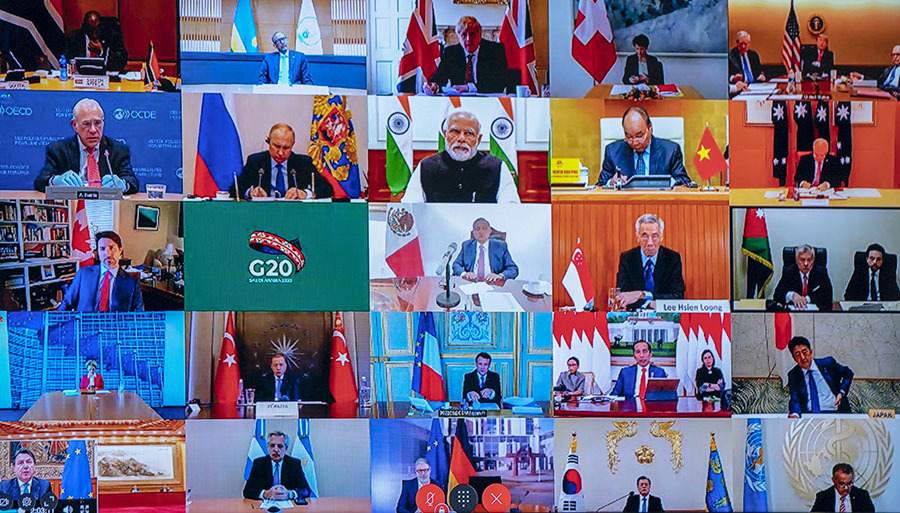The world economy has entered a phase of recession. On Friday, March 27, said Managing Director of the International Monetary Fund (IMF) Kristalina Georgieva.
“Now it is clear to everyone that we have entered a recession, which is just as terrible or even worse than in 2009. We expect recovery in 2021. It may turn out to be quite significant, but only if we manage to cope with the virus around the world and prevent liquidity problems, ”the head of the IMF said.
Meanwhile, according to her, in 2020 "the recession is expected to be quite deep." Thus, a recession can cause a wave of bankruptcies and the loss of a large number of jobs. Such a situation risks not only preventing the restoration of the world economy, but also “destroying the foundation of society,” Georgieva said.
According to Anton Pokatovich, the chief analyst of BCS Premier, in an interview with RT, according to the results of the year, the world economy can either show zero growth or sag by 0.5%. At the same time, experts at the Institute of International Finance (IIF) forecast a drop in global GDP by 1.5% at once. For comparison, according to the IMF, in 2009 the decline was 0.1%.
“The crisis of 2008 was not accompanied by the destruction of technological and logistic chains around the world, did not create a situation where production stops and borders between countries are closed,” Pavel Sigal, First Vice President of the All-Russian Public Organization of Small and Medium Enterprises, told RT.
According to official data from the World Health Organization (WHO), the total number of coronavirus infected in the world exceeds 509 thousand, of which more than 23 thousand died.
The spread of the disease and quarantine measures introduced by states provoked a massive reduction in the volume of trade and passenger traffic in the world. As previously estimated by the UN Conference on Trade and Development (UNCTAD), due to the effects of coronavirus in 2020, the global economy could lose up to $ 2 trillion. However, according to the assessment of RT analysts surveyed, the total amount will be several times higher.
“Only the world tourism industry by the end of the year can lose about $ 1 trillion and lose 50 million jobs. At the same time, about 60 sectors of the economy are somehow tied to tourism. As a result, the total global losses of the global economy may exceed $ 5 trillion. It is expected that global trade can be halved, and unemployment can grow by 30-50%, ”said Pavel Sigal.
Amid the collapse of world trade, a significant reduction in global production may occur. Anna Bodrova, a senior analyst at the Alpari Information and Analytical Center, spoke about this in an interview with RT.
“The most affected sector of the global economy will be trade. Everything else - production and production - will go downhill as soon as consumption parameters fail. Demand for cars is falling sharply. Demand for clothes and shoes is noticeably reduced - they are not needed if you are sitting at home. All this will negatively affect production sectors and affect raw material prices, ”Bodrova emphasized.
Pumping money
As previously stated by Kristalina Georgieva, from the beginning of the spread of the disease, global investors withdrew about $ 83 billion from emerging markets. Capital outflows have become the largest for all time of observation. Moreover, according to the assessment of the head of the IMF, developing countries will need $ 2.5 trillion to overcome the crisis.
However, world governments have already responded to the threat of a global economic downturn. So, on the eve of the G20 summit, the heads of state agreed to invest more than $ 5 trillion in the global economy to overcome the financial consequences of the coronavirus pandemic.
- AFP
“In order to“ smooth out ”the blow to the economy, the authorities will continue to implement large-scale support measures. However, this may increase pressure on state budgets. At risk are countries whose budget systems have previously been under increased pressure, for example, the same major European economies (Italy or France). In addition, developing countries that cannot “boast” a significant margin of macroeconomic strength are at risk, ”said Anton Pokatovich.
In addition to financial assistance from governments, the global economy may also be supported by cash injections from global central banks. For example, on March 23, the US Federal Reserve announced an unprecedented expansion of its quantitative easing program.
The regulator plans to buy bonds in the stock market in an unlimited volume. Such a policy should lead to an increase in the money supply in the economy and help increase GDP growth rates. As expected, other central banks can take similar measures.
“Global central banks - the ECB, the Fed, or the Bank of England - will print money and pump up the global financial system until the entire economic body is filled with them. This is such a "mechanical ventilation system" until the patient can breathe on his own. But now no one knows exactly when this will happen, ”Anna Bodrova concluded.

